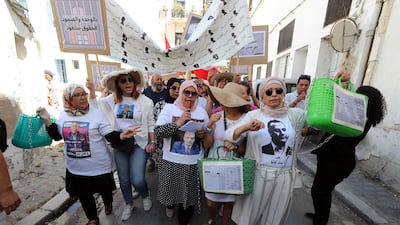Tunisian President Kais Saied has signed an order granting a special presidential pardon to more than 1,700 people detained over social media posts critical of the government.
About 233 out of 1,727 detainees have been released, a statement from the presidency said on Thursday, adding that the rest have had their sentences reduced, without providing any further details.
The Tunisian presidency said only those “sentenced not on the basis of the posts that were published but on the basis of other crimes” were excluded from the pardon.
The statement added that the directive was issued based on Article 99 of the constitution which stipulates dropping the punishment of those detained for crimes related to publishing social media posts.
The order coincided with the 67th anniversary of Tunisia's independence and comes ahead of presidential elections on October 6 in which Mr Saied will be running again.
In September 2022, the president issued Decree Law 54 to combat cybercrime, but it has been used to penalise those sharing social media posts critical of his government.
Journalists and human rights organisations have raised concerns about the decree's potential effect on freedom of expression and freedom of the press.
Thursday also marks the third year since Mr Saied introduced what he called “exceptional measures” dissolving the Tunisian parliament and high judicial council, consolidating all branches of authority under his rule.
A continuous state of emergency has been in place in the country since 2015 following a terrorist attack by ISIS on a presidential guards’ bus that killed 12 of its members and injured 16 others, including civilians.
The legal measure enables authorities to do whatever is considered necessary to protect the country from “imminent danger”.
Critics and the opposition say credible elections cannot be held in Tunisia unless imprisoned politicians are released as most of them are Mr Saied's opponents.
About 50 people, including opposition leaders and families of political detainees, held a protest on Thursday in the downtown area of the capital, Tunis, calling for the release of imprisoned politicians.
Protesters shouted slogans such as “Down with the shameful Decree 54”, “No fear, no terror, power belongs to the people,” and “Freedom, freedom, the judiciary is following orders”.
“Today, we want this fear to be lifted for families of all the political detainees without any exception. We will continue and we will not give up until the end of this injustice,” said Feiza Chebbi, wife of detained politician and lawyer Issam Chebbi, who is also the secretary general of the opposition Al Jomhouri party, in a speech at the demonstration.
On the sidelines of the gathering, Mohamed Hamdi, a former education minister and ex-MP in Tunisia's post-2011 uprising National Assembly, denounced “the setback to the political situation” in the country.
“We are going through a major setback that coincides with the independence anniversary and which unfortunately also marks almost three years since Kais Saied’s coup,” Mr Hamdi told The National.
“He has been persistent in his policy of bulldozing political life, confiscating public space, and attacking general and individual freedoms.”
Dozens of Mr Saied's critics have been placed under pre-trial detention or house arrest, with others banned from travelling – sometimes without being charged – due to the continuing state of emergency.
Judges have also sentenced some critics to prison terms ranging from six months to five years.
Among them are Ennahda opposition party leaders Rached Ghannouchi and Rafik Abdessalem – the latter currently on the run abroad – who were sentenced to three years in prison in February.
Mr Abdessalem, who served as Minister of Foreign Affairs between 2011 and 2013, had previously been sentenced to five years in prison following a Facebook post he wrote in February 2023.
In May, prominent Tunisian journalists Mourad Zghidi and Borhen Bsaies were each sentenced to a year in prison after being convicted over critical statements they made on the radio and in social media posts.
Al Jomhouri party spokesman Wissem Sghaier told The National that this approach by the government “can only deepen the crisis in the country”, especially during an electoral period “in which it would have been better to establish a climate of freedom and rivalry to choose someone to represent the Tunisian people”.
Like many of the protesters, Mr Sghaier remains hopeful that the current status quo will eventually change, despite all the challenges.


